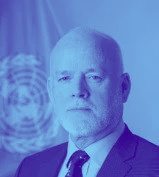VISION
"I need the sea because it teaches me.”
That is the opening line of Pablo Neruda’s memorable poem, The Sea . As a child growing up along the coastlines of Fiji, the sea taught me the absolute wonder and joy of life. But today the lesson is a different one. It is an alarming lesson of humankind having pushed planetary boundaries of sustainability to the limit; a lesson of climate change heading in very dangerous directions, of collapsing biodiversity on land, and of a cycle of decline well underway in the Ocean. Having heard the lesson, the clarion call is clear: it is the responsibility of us all to take action to pull the world back from those perilous boundaries.
In such challenging times there are some core developments that give us heart. First and foremost, we have put in place a plan to save humankind from looming disaster. In 2015, for this very purpose, the international community adopted the Paris Climate Agreement and the 2030 Sustainable Development Agenda. Implemented with integrity, these two universal measures will provide our grandchildren with a planetary environment compatible for a healthy existence. Thus, beyond all other aspirations, the implementation of that bold plan must take precedence. The health of life in the Ocean is absolutely dependent on this.
The bad news at this stage is that we have still not bent the curve on GHG emissions and global warming predictions. This is indeed bad for the Ocean, as the bending of that curve is the answer to most of the Ocean’s problems; and here I refer to dying coral, acidification, deoxygenation, deteriorating ecosystems, proliferating dead zones, changing Ocean currents, Ocean warming, and rising sea levels. To that list should be added such other anthropogenic effects as declining fish-stocks and marine pollution, led of course by the plastic plague.
The good news is that since the holding of The Ocean Conference at the United Nations in June 2017, a massive wave of awareness of the need for Ocean Action has swept around the world. Governments are legislating against single-use plastics and micro-beads, and are increasingly incorporating sustainable Ocean policies into national plans. International organisations and regional bodies are adopting responsible Ocean practices, such as the recent adoption by the International Maritime Organisation of a strategy to halve GHG emissions from the global shipping fleet by 2050.
Civil Society, NGOs and community organisations are no longer preaching to the unconverted, for citizens are increasingly making Ocean Action demands of governments, while consumers around the globe are building environment-conscious expectations of the business sector. From the many to the individual, from good governance to responsible business, from local communities to multinational organisations, we are no longer willing to be party to the destruction of the environment upon which life depends.
Within the 2030 Sustainable Development Agenda is the Ocean goal, known as Sustainable Development Goal 14 or SDG14. It sets out to conserve and sustainably use the Ocean’s resources, to get the balance right between protection and production, so that the Ocean’s bounteous resources are sustained for all time. In pursuit of SDG14’s imperative, the private sector has a crucial role to play. Be it in fisheries, aquaculture, shipping, minerals, energy, coastal infrastructure, maritime security, genetics or tourism, the success of the Sustainable Blue Economy will lie primarily in the hands of the businesses responsibly applying themselves to the opportunities at hand.
The spirit of the age is one of partnership, and this doubly applies to the Sustainable Blue Economy; so let us foster a culture of inclusiveness in the interactions of business, government, finance, society and science as we strive for the common good. To make the right business and policy decisions, science must be our guide, thus we warmly welcome the upcoming UN Decade for Ocean Science. As we move forward with the Sustainable Blue Economy, if we are to equitably share its benefits, the public and private sectors must develop fresh dynamics of trust, public transparency, and respect for the contributions of Nature.
As sure as sea levels are rising, the state of the Ocean will govern how humanity fares on Planet Earth. A prosperous future will require us all, business sector included, to use the principle of sustainability as our guide. To get there we must accept that everything is connected: that what we do on land has profound implications for the Ocean, that developed and developing are inextricably linked, that the public and private sectors equally need each others ideas, energy and cooperation.
Properly managed through good governance, with the application of necessary finance and investment, and with the development and sharing of technologies and resources, we can confidently expect the Ocean to be the major source of food and health for humankind. For the foreseeable future, the Ocean will continue to be the medium upon which global trade relies. We can depend on it to be a primary supplier of our energy needs, of our genetic resources, of our oxygen and climatic stability. And yes, if we stay true to the Paris Climate Agreement and the 2030 Sustainable Development Agenda, the Ocean it will go on, through art, culture, and tourism, to teach our children and grandchildren the great wonder and joy of life on this planet.
In September 2017, Ambassador Peter Thomson of Fiji was appointed as the United Nations Secretary-General’s Special Envoy for the Ocean, to drive forward the outcomes of the 2017 United Nations Ocean Conference in support of Sustainable Development Goal 14, to conserve and sustainably use the Ocean’s resources for sustainable development.
A massive wave of awareness of the need for Ocean Action has swept around the world
The spirit of the age is one of partnership
The state of the Ocean will govern how humanity fares on Planet Earth















